Chamanna Cluozza
Sustainability in action at the National Park Hut
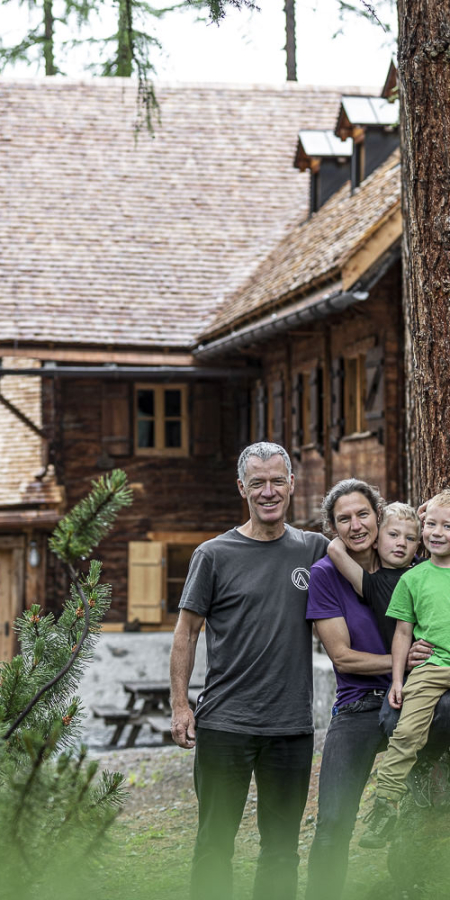
After about three and a half hours of hiking, you reach the Chamanna Cluozza from Zernez, beautifully situated on a hill in the wild Val Cluozza in the middle of the Swiss National Park. Each guest is welcomed with a glass of tea made from organic herbs grown in Guarda.
Welcome to the wilderness
«The personal welcome is very important to us and part of our sustainability philosophy,» says Nicole Naue, who runs the only hut accommodation in the national park together with her husband Turi.
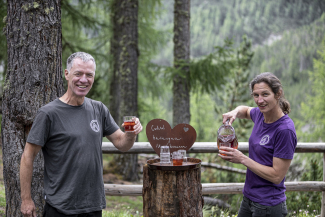
Nothing but untouched nature
Thanks to its seclusion and simple furnishings, the hut offers an authentic experience close to nature. The Chamanna Cluozza is therefore very popular. On average, 4500 guests stay there per season, a peak value compared to other mountain huts. In 2022, there were even 5700 guests – a record!
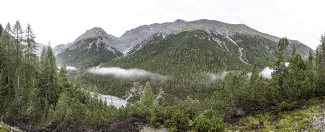
The reasons for the record year were, on the one hand, the continuously beautiful weather and, on the other hand, the reopening after a major renovation. The goal of the renovation was to operate the hut as low-emission, resource-conserving and energy-autonomous as possible.
Putting sustainability into practice
The National Park would like to create a showcase example of sustainable hut operation – just the right challenge for the Naue family, who practically exemplify environmental awareness and creatively put it into practice.
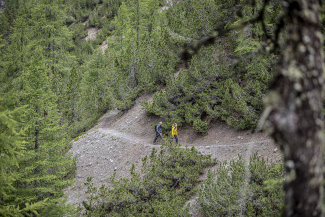
Larch blossom syrup instead of Coca Cola
For those who long for a cool Coca Cola after the strenuous hut climb, they explain: «Unfortunately, we can't serve you with that. How about a homemade syrup instead? We have larch blossom, weeping cherry or cola herb, all from the region. We are also happy to serve you the syrup fizzed.»
Everything you see and eat in the and eats in the hut was brought brought up at great expense.
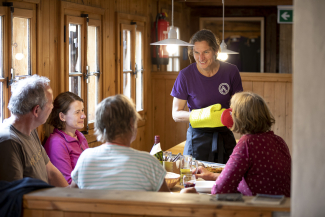
Nicole and Turi Naue refrain from having sweet drinks and mineral water in PET bottles flown to the hut by helicopter, but use the tested spring water on site. Some guests are already surprised, but the positive reactions outweigh the negative, says Nicole.
Four transport flights less
The syrups and teas are appreciated because they are something special and local. And above all, this has saved around three tonnes of weight and four transport flights. This means: less noise, less CO2 emissions and less waste.
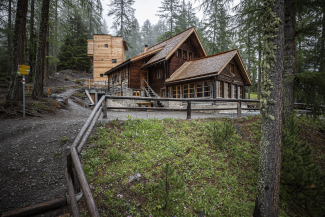
Turi says: «We are also about making people aware; showing them that everything they see and eat in the hut has been brought up at great expense.»
Backpack instead of helicopter
A lot of effort means: by helicopter or on foot. Everyone who works at the hut carries up a few kilos of food on the ascent. And the guests themselves can also supply the hut with fresh produce. Because if you hike from Zernez to the hut, you pass a refrigerator and can pack potatoes, carrots, lettuce, etc. in your backpack.
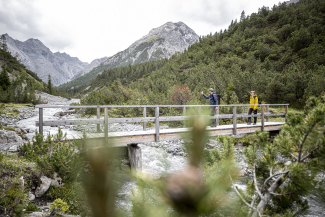
Nicole and Turi were surprised at how much the guests brought to the hut: «Hiking groups made fun of emptying the whole fridge so that we could fill it twice a day. Even children proudly carried up a stick of leek or a few carrots.»
Three more flights avoided
In total, guests transported over two tonnes of food. Expressed in helicopter loads, this means: Three more flights through the lonely Val Cluozza could be avoided.
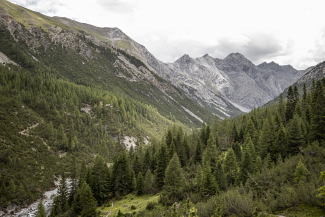
Financially, however, the saved helicopter flights are not directly worthwhile, says Turi, since filling the refrigerator and receiving the food in chunks at the hut means extra logistical effort. «But for the environment, every kilo saved is valuable.»
«Sustainable Destination» by TourCert
The active environmental awareness at the Chamanna Cluozza is certified. Since summer 2022, it has carried the «Sustainable Destination» award from the international certification provider TourCert. This in cooperation with the holiday regions Engadin Scuol Zernez and Val Müstair – the first destination in Switzerland to be awarded by TourCert.

Even at the National Park Hut, it's not possible to do without supply flights. Because the guests eat much more than people can carry up. Alcoholic drinks – wine bottles and beer kegs for open bar – are also flown up.
Around one third of the supply flights could we have been able to save.
As the former environmental officer of the SAC Bern Section, Nicole Naue knows the flight frequencies of other huts and explains: «Compared to the average, we recorded about a third fewer helicopter flights, calculated in terms of kilos flown per overnight stay.»
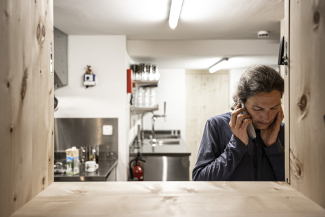
Fewer helicopter flights are one side of a sustainable concept; operating the hut as self-sufficiently and environmentally friendly as possible is the other. The Swiss National Park laid the decisive foundation stone for this with the conversion in 2021, when it invested over 2.7 million Swiss francs in the hut.
Simple mountain hut remained
The investments went mainly into sustainability projects: for example, into optimising the micro hydroelectric power plant or into the new waste water treatment using worm compost and plant-based purification. As before, the hut itself is deliberately furnished simply, in keeping with the charm of this wonderful place.
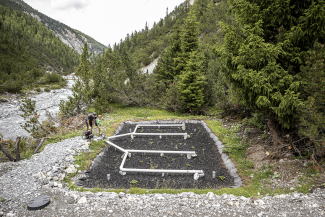
A residential tower for the hut team
The new roof made of Engadine larch shingles and the new residential tower behind the hut catch the eye. This houses the private rooms of Nicole, Turi and their two boys Leo (7) and Till (6). The staff also sleeps in the simple knitted building made of larch wood. «From an architectural point of view, this is probably the most exclusive hut team dwelling in the Alpine region,» as Nicole Naue, a trained architect, calls her retreat.

Before the Naue family took over the Chamanna Cluozza, they had run the Trifthütte in the Bernese Oberland for seven years. The family was portrayed there twice for «SRF bi de lüt – Hüttengeschichten». After an avalanche destroyed large parts of the Trifthütte in January 2021, operations had to be discontinued and the family had to look for a new hut.
From the High Mountains to the National Park
The change from the barren high mountain hut (2520 m) to the national park hut (1889 m) surrounded by larches also pleased the children. Here they see wild animals, rare bird species, a diverse plant world and the changing of the seasons. In addition, many more families with children spend the night here.
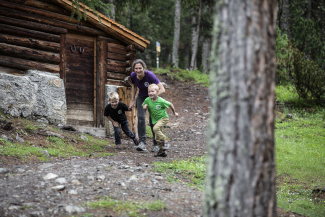
Exciting nature playground
Leo and Till go to school in Zernez, but are at the hut as often as possible and help out. An important task is to show the other children where they are allowed to play and where not. The permitted radius of movement around the hut is not very large, but all the more exciting for that. As is well known, you are not allowed to leave the hiking trails in the Swiss National Park, and this applies to guests as well as to the hut warden family.
We cook and bake practically everything ourselves. We do not use we do not use any products completely.
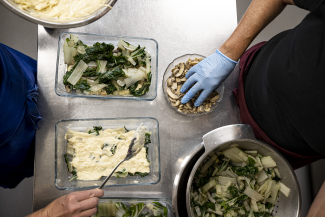
Regional and organic as far as possible
Using fresh and regional products, organic whenever possible, is another component of the sustainability practised at the Chamanna Cluozza. «We cook and bake practically everything ourselves, including Engadine nut tarts and bread made from Granalpin organic flour. We do not use any ready-made products at all,» says Nicole Naue. For dinner there is always a vegetarian option and usually a meat option; about two thirds are served as veggies and one third as meat.
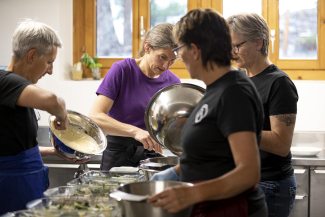
Preparing all the vegetables and baking bread and cakes requires a lot of effort. Nicole and Turi Naue do all the work together with three employees and volunteers. Around 50 people from all over Europe came to the hut in the summer of 2022 to help out for a few days. For food, lodging and the unique hut experience in the National Park.
Family compatible prices
«We want to pass on our offer at reasonable, family-compatible prices, which is why we depend on many volunteers. Without them, we could not implement our concept,» Turi explains. «It is also a great pleasure to be able to make a difference with so many different people.»
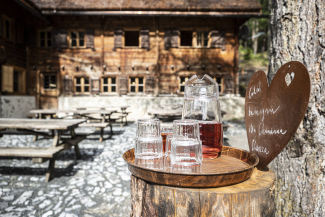
Text: Franco Furger
Images: Andrea Badrutt
Video: On Air AG



